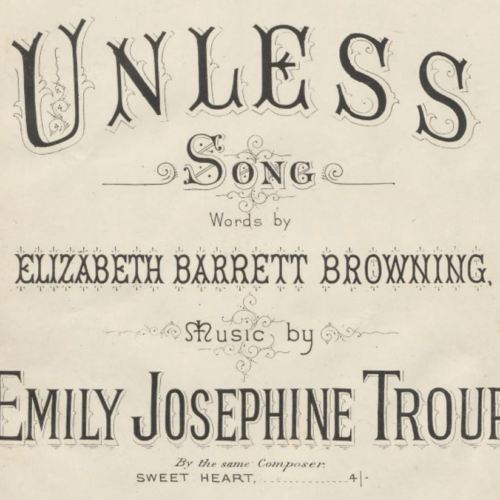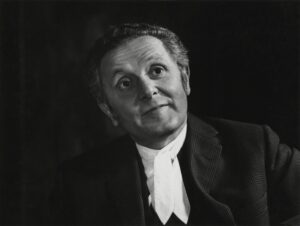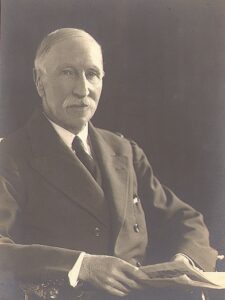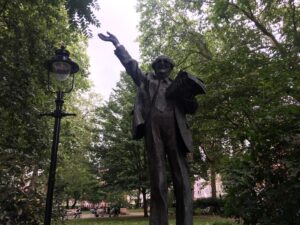

Emily Josephine Troup was a composer, poet, and editor, who played a leading role in the musical life of South Place (now Conway Hall Ethical Society), and within the early Ethical movement. Said to be ‘always overflowing with cheerfulness and vivacity’, she was much mourned upon her death in 1913, but has been little remembered since. In recent years, however, her legacy has been firmly acknowledged in the scholarship of Jessica Beck, as increasing attention is paid to the role of music, and to women, in the burgeoning humanist movement.
An obituary printed by the South Place Ethical Society in May 1913 (reproduced below) made clear Troup’s significant impact on the musical life of South Place, and within the Ethical movement as a whole.
No heritage of our Society do we prize more than the memory of the high-souled men and women who have from time to time made it their spiritual home, and enriched it by their presence. Among that ever-growing band we must now include the bright and beautiful spirit of Emily Josephine Troup – the “Eliza Flower” of our generation – who passed away on April 11 at her home, High Meadow, Saltwood, Kent.
The youngest daughter of John Troup, Esq., of Essex Lodge, Clapton, her earlier years were spent among Unitarian surroundings, whence probably she acquired the habit of industry that led her to develop so fully her exceptional musical and literary gifts, and the keen sense of duty that made her ever anxious to use them as a means of social service.
Active interest in the Sunday Evening concerts was her first work for South Place; between January, 1889, and February, 1902, she took part in them no less than forty-nine times, besides rendering the Committee the great service of introducing Mr. John Saunders. Later, when she joined the Ethical Movement, there was not a Society in London that did not benefit by her ready help and sympathy, whilst her generous financial aid extended even to kindred associations in America. No service that she could render was ever too lowly or too arduous; whatever was most needed she accepted as her special task, whether it involved distributing handbills, delivering a lecture, or composing an anthem. Among the more manifest of her gift to the Movement may be mentioned the “Every-day Songs,” which bring such a joyous note into our Children’s Services; and the three Ethical Hymn Books she edited and compiled, so frequently contributing verse or music that, to quote her own words, “for very shame’s sake” she veiled her identity under a variety of pseudonyms. The last of these Hymn Books was only compiled a few months ago for use at South Place, and Miss Troup also defrayed a large part of the cost of its production.
More precious even than her musical and literary gifts were her sweet personality, large-hearted friendship, and wide sympathies. United to an exceptionally modest and gentle nature was a keen sense of justice and an artist’s desire that talent should be recognised and encouraged; it was typical of her that she should found a scholarship at the Royal Academy of Music for girl students devoting themselves to composition, particularly of orchestral works. Not infrequently she would do her kindly deeds by stealth, and many a man and woman have had reason to thank the unknown source of some timely aid or gift.
Cheerfulness and courage were so much a part of her being that it would seem unworthy of her memory to dwell on the long months of suffering so heroically borne, or to lament the bright intellect cut short whilst still in the fulness of its power; rather must we rejoice in the remembrance of all she achieved, in the warmth of the affection she so freely gave and inspired, and in the certainty that not even the passing of her spirit can stay its beneficent influence.
Verses from her pen frequently appeared in the “South Place Magazine” and the “Ethical World,” and her attitude towards life is best expressed by one of her own beautiful sonnets:
How exquisite is cloud, when flowing high
Above the tufted pines, it curls and seethes
About the rugged mountain-peaks, and sheathes
In silver fleece their rents and scars, moved by
The law that is sweet Nature’s sympathy!
So exquisite is love, that gently breathes
Its tenderness about our human scars, and wreathes
Its beauty round us in a close fidelity.
So beautiful is love, that will not leave
The life that’s flowerless to its lone despair.
But steals with healing touch and tender care
To its cold side, and will not let it grieve;
And asking no return, no answering glow,
Would shield its loved one, and is happy so.
In Memoriam from the South Place Ethical Society (May 1913)
The Women Musicians of South Place Ethical Society, 1887–1927 by Jessica Claire Beck

It was the start of opening up society to be more caring and sensitive. One was battling for all men […]

…for a long time, like the philosophers of old, I was trying to find indisputable foundations. How long it took […]

As well as being home to Conway Hall and its humanist library, Red Lion Square contains statues of two prominent […]